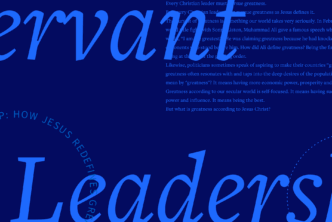Last night, I opened up C.S. Lewis’ A Grief Observed for the first time in several years. As I began to read, I remembered the first time I read Lewis’ work. It was a powerful and stirring point in my life. It helped me to read Scripture in a new light. Instead of the flat, two-dimensional perspective I had held for so long, the Bible now held an added element: emotion.
Love, hate, grief, joy, and sorrow all flowed out of the text. With Lewis’ writing, a new dimension was added to my understanding. A few months later, I had the privilege of preaching through John 11. The depth of Jesus’ emotions swept over me as I read John 11:35: “Jesus wept.” To imagine the divine Son of God weeping struck me afresh as I thought of my own personal losses.
As Lewis’ stepson Douglas Gresham remarks in his introduction:
I had yet to learn that all human relationships end in pain—it is the price that our imperfection has allowed Satan to exact from us for the privilege of love.
The powerful grief of Lewis’ journals captures many of our hearts. Whether we have lost a spouse or not is irrelevant. Through our lives, each of us has lost friends, siblings, parents, or children. This is why A Grief Observed is, in my opinion, one of the finest works in Lewis’ repertoire.
The cathartic power of self-expression
Lewis illustrates the personal nature of loss as he writes:
For the first time I have looked back and read these notes. They appall me. From the way I’ve been talking anyone would think that H.’s death mattered chiefly for its effect on myself. Her point of view seems to have dropped out of sight. Have I forgotten the moment of bitterness when she cried out, ‘And there was so much to live for’?
And still, even as this personal pain impresses itself upon each and every one of our lives, there is incredible value in self-expression and reflection. Those of us who have suffered the death of a loved one are sometime so afraid to express our sense of loss to a friend. But here, even as Lewis ridicules his own selfishness, it is its very expression that has allowed him to acknowledge it—and to move beyond it.
The process of moving forward
And so, Lewis limits the contents to four manuscript books:
I resolve to let this limit my jottings. I will not start buying books for the purpose. In so far as this record was a defence against total collapse, a safety-valve, it has done some good. The other end I had in view turns out to have been based on a misunderstanding. I thought I could describe a state; make a map of sorrow. Sorrow, however, turns out to be not a state but a process.
Lewis asks the hard questions—questions that any one of us might, in a similar fit of despair, find ourselves asking. And yet, there is comfort within this short book: the comfort that we are not alone. That this path, no matter how rocky, and filled with obstacles, has been traveled before us by another.
Discover Lewis for yourself
A Grief Observed is part of the 30-volume C.S. Lewis Collection. The Logos editions of C.S. Lewis’ works allow you to not only read the depth of his writing, but to discover new elements as well. With Logos, you can search his writings to compare his powerful thought and emotion, as well as to discover the same thread running through his other works and letters. You’ll get digital, searchable volumes of Lewis’ best works that allow you to study his insights like never before.
For a limited time, get the C.S. Lewis Collection for 30% off. Pre-order now to lock in this special price!




